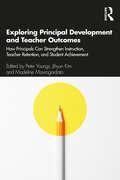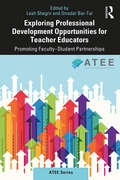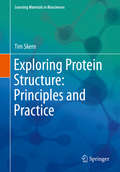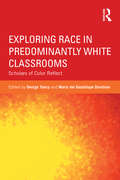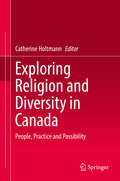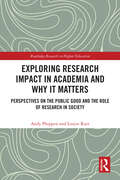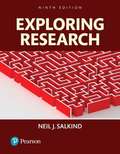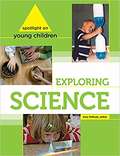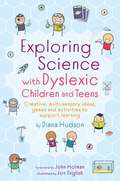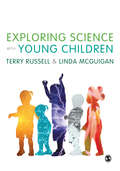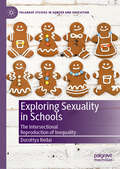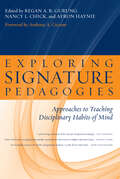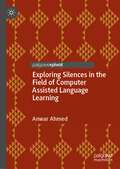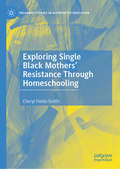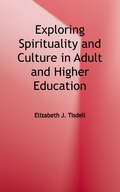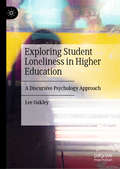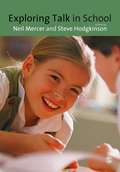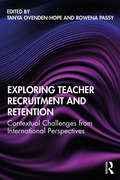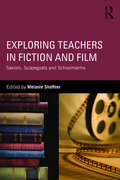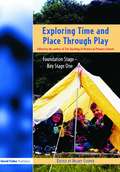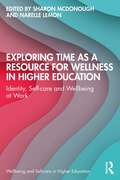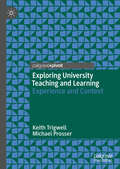- Table View
- List View
Exploring Principal Development and Teacher Outcomes: How Principals Can Strengthen Instruction, Teacher Retention, and Student Achievement
by Peter Youngs, Jihyun Kim and Madeline MavrogordatoThis edited volume examines innovative ways of preparing, supervising, and evaluating principals and explores factors that promote effective leadership practices. Chapter authors consider how principals’ leadership practices affect teachers’ instruction, satisfaction, commitment, retention, and effectiveness, and present evidence that principals can influence key student outcomes as well. Covering topics such as school leaders’ use of time, their efforts to reduce implicit bias, how leadership practices are associated with teachers’ workplace attitudes, leadership and student achievement, and how school leaders can best be supported under new federal legislation, this volume is a “must read” for educational leadership and policy faculty, school and district administrators, and researchers committed to promoting effective principal leadership.
Exploring Professional Development Opportunities for Teacher Educators: Promoting Faculty-Student Partnerships (ATEE Series)
by Leah ShagrirFocusing on the partnerships and collaborations between teacher educators and students with regards to faculty members’ professional development, contributors from around the world provide insight into professional development opportunities in the context of teaching and collaborating with students. Contributions from these distinguished scholars come from a broad range of countries and cultures to ensure that the presented studies reveal rich information about diverse systems of teacher education. The studies presented in the book demonstrate how these faculty student partnerships can significantly assist faculty members to develop professionally and produce benefits and impacts on their professional identity. Providing ideas and tools aimed at teacher educators around the world, this book explores partnerships and cooperation as a tool to lead to development and ultimately promotion. This book is a must-read for all researchers, teacher educators and lecturers looking to expand their knowledge of partnerships with students in higher education.
Exploring Protein Structure: Principles and Practice (Learning Materials in Biosciences)
by Tim SkernThis textbook introduces the basics of protein structure and logically explains how to use online software to explore the information in protein structure databases. Readers will find easily understandable, step-by step exercises and video-trainings to support them in grasping the fundamental concepts.After reading this book, readers will have the skills required to independently explore and analyze macromolecular structures, will be versed in extracting information from protein databases and will be able to visualize protein structures using specialized software and on-line algorithms. This book is written for advanced undergraduates and PhD students wishing to use information from structural biology in their assignments and research and will be a valuable source of information for all those interested in applied and theoretical aspects of structural biology.
Exploring Race in Predominantly White Classrooms: Scholars of Color Reflect (Critical Social Thought)
by George Yancy Maria del Guadalupe DavidsonAlthough multicultural education has made significant gains in recent years, with many courses specifically devoted to the topic in both undergraduate and graduate education programs, and more scholars of color teaching in these programs, these victories bring with them a number of pedagogic dilemmas. Most students in these programs are not themselves students of color, meaning the topics and the faculty teaching them are often faced with groups of students whose backgrounds and perspectives may be decidedly different – even hostile – to multicultural pedagogy and curriculum. This edited collection brings together an interdisciplinary group of scholars of color to critically examine what it is like to explore race in predominantly white classrooms. It delves into the challenges academics face while dealing with the wide range of responses from both White students and students of color, and provides a powerful overview of how teachers of color highlight the continued importance and existence of race and racism. Exploring Race in Predominately White Classrooms is an essential resource for any educator interested in exploring race within the context of today’s classrooms
Exploring Religion and Diversity in Canada: People, Practice and Possibility
by Catherine HoltmannThis book is intended for advanced undergraduate and graduate students interested in learning about the many ways in which religious diversity is manifest in day-to-day life Canada. Each chapter addresses the challenges and opportunities associated with religious diversity in a different realm of social life from families to churches, from education to health care, and from Muslims to atheists. The contributors present key concepts, relevant statistical data and real-life stories from qualitative data. The content of the book is supplemented by links to online learning resources including videos, websites and photo essays.
Exploring Research Impact in Academia and Why It Matters: Perspectives on the Public Good and the Role of Research in Society (Routledge Research in Higher Education)
by Andy Phippen Louise RuttPosing fundamental questions around the worth of knowledge creation and the social value of in-depth research, this volume offers a novel approach by exploring why impact is important in academic research, rather than explaining how it should be conducted.Using qualitative data to unpack what research impact really constitutes, this book foregrounds the practicalities of achieving impactful, high-quality academic research, and argues for the importance of best practice in instilling public and reputational value of research for wider societal gain. Chapters unpack the concept of impact, and discuss how it can be made more tangible and realisable, particularly in the context of theoretical or pure research where research outcomes are often obscure. Calling for greater clarity in how to articulate the value of impact within research strategies, the book will ultimately argue for the central role of impact in core research processes and support the development of career researchers in their practical roles and identity formation.The book will be of interest to academics and postgraduate students involved with research methods, research policy, and higher education more broadly. Despite the predominantly UK-based context of the research, the volume will have resonance in countries where knowledge economy concepts have impacted on higher education policy and practice, and so research managers and higher education policy advisors may also find the book of interest.
Exploring Research: Ninth Edition
by Neil J. SalkindFor courses in Experimental Methods and in Research Methods in Political Science and Sociology <P><P>An informative and unintimidating look at the basics of research in the social and behavioral sciences <P><P>Exploring Research makes research methods accessible for students – describing how to collect and analyze data, and providing thorough instruction on how to prepare and write a research proposal and manuscript. Author Neil Salkind covers the research process, problem selection, sampling and generalizability, and the measurement process. He also incorporates the most common types of research models used in the social and behavioral sciences, including qualitative methods. The Ninth Edition explores the use of electronic sources (the Internet) as a means to enhance research skills, includes discussions about scientific methods, and places a strong emphasis on ethics. <P><P>NOTE: This ISBN is for a Pearson Books a la Carte edition: a convenient, three-hole-punched, loose-leaf text. In addition to the flexibility offered by this format, Books a la Carte editions offer students great value, as they cost significantly less than a bound textbook.
Exploring Science (Spotlight On Young Children)
by Amy Shillady National Association for the Education of Young Children StaffChildren’s early SCIENCE experiences, at school and at home, are the foundation for future science learning and comprehension―throughout the school years and life. This collection of articles from NAEYC’s journal Young Children showcases exciting ways to support children’s science explorations from infancy through age 8. The authors offer ideas for science-rich environments and hands-on activities that promote young learners’ investigations and discovery. The articles describe teaching approaches and child-initiated projects that introduce children to scientific and engineering practices, and concepts in the physical, life, and earth and space sciences and in engineering and technology.
Exploring Science with Dyslexic Children and Teens: Creative, multi-sensory ideas, games and activities to support learning
by Diana HudsonThis book is a collection of ideas, activities and approaches for science learning, to support kids with learning differences aged 9+ to grow in confidence, recall and understanding. The multi-sensory and fun ideas and activities can be adapted to suit individual students' needs and skills, and curriculum stage. Written by an experienced science teacher, the book includes mnemonics, art, drama and poetry activities, board games, card games, and more. All of these strategies will aid neurodiverse students' science learning and memory through boosting their creative thinking, encouraging a play-based and exploratory approach to science. Whether you want to get creative, play a game or try out a fun experiment, you can dip in and out of the activities to suit your student's unique learning style. The activities in the book will help creative thinkers who learn differently to take alternative approaches to tricky topics, grasping a fundamental understanding of key scientific concepts, whilst gaining confidence as the scientists of tomorrow.
Exploring Science with Young Children: A Developmental Perspective
by Professor Terry Russell Linda McGuiganThe Association for Science Education Book Award 2016, Finalist. Science in the early years is about more than developing understanding of key scientific concepts, it is about encouraging imagination, creativity and curiosity and nurturing key scientific skills to form a firm base for learning. Understanding how best to do this for young children aged 3-7 is the focus of the book. By concentrating on practical and naturally occurring experiences the authors look at meeting the needs of the curriculum with children at the centre of their own learning. Chapters look at how to work with children to: Find out and develop their own ideas Get them inquiring scientifically Use evidence to support their views This book will really help develop the whole child across the curriculum and make sure they have the skills they need for later learning.
Exploring Science with Young Children: A Developmental Perspective
by Linda Mcguigan Professor Terry RussellScience in the early years is about more than developing understanding of key scientific concepts. It is about encouraging imagination, creativity and curiosity and nurturing key scientific skills to form a firm base for learning. Understanding how best to do this for young children aged 3-7 is the focus of the book. By concentrating on practical and naturally occurring experiences the authors look at meeting the needs of the curriculum with children at the centre of their own learning. Chapters look at how to work with children to: · Find out and develop their own ideas · Get them inquiring scientifically · Use evidence to support their views This book will really help develop the whole child across the curriculum and make sure they have the skills they need for later learning.
Exploring Sexuality in Schools: The Intersectional Reproduction of Inequality (Palgrave Studies in Gender and Education)
by Dorottya RédaiThis book explores the place of sexuality in a Hungarian vocational school. Building upon ethnographic research using a post-structuralist and intersectional theoretical framework, the author highlights the voices of teachers and students in their everyday environment and gives them the opportunity to speak about themselves and their experiences: in doing so, addressing a significant gap in the market. The author critically discusses key issues concerning schooling and sexuality, addressing such themes as LGBTQ+ youth and teachers, institutional hierarchy, and the role of sexuality in the re/production of social inequalities through education. Through these topics, she sensitively questions what should be expected of schools in preparing their students for the wider world. The intersectional approach employed by the author will appeal to scholars in a wide variety of disciplines, from gender and sexuality studies to the sociology of education and race and ethnicity studies.
Exploring Signature Pedagogies: Approaches to Teaching Disciplinary Habits of Mind
by Regan A. R. Gurung Nancy L. Chick Aeron HaynieFrom the Foreword“These authors have clearly shown the value in looking for the signature pedagogies of their disciplines. Nothing uncovers hidden assumptions about desired knowledge, skills, and dispositions better than a careful examination of our most cherished practices. The authors inspire specialists in other disciplines to do the same. Furthermore, they invite other colleagues to explore whether relatively new, interdisciplinary fields such as Women’s Studies and Global Studies have, or should have, a signature pedagogy consistent with their understanding of what it means to ‘apprentice’ in these areas." -- Anthony A. Ciccone, Senior Scholar and Director, Carnegie Academy for the Scholarship of Teaching and Learning.How do individual disciplines foster deep learning, and get students to think like disciplinary experts? With contributions from the sciences, humanities, and the arts, this book critically explores how to best foster student learning within and across the disciplines. This book represents a major advance in the Scholarship of Teaching and Learning (SoTL) by moving beyond individual case studies, best practices, and the work of individual scholars, to focus on the unique content and characteristic pedagogies of major disciplines. Each chapter begins by summarizing the SoTL literature on the pedagogies of a specific discipline, and by examining and analyzing its traditional practices, paying particular attention to how faculty evaluate success. Each concludes by the articulating for its discipline the elements of a “signature pedagogy” that will improve teaching and learning, and by offering an agenda for future research.Each chapter explores what the pedagogical literature of the discipline suggests are the optimal ways to teach material in that field, and to verify the resulting learning. Each author is concerned about how to engage students in the ways of knowing, the habits of mind, and the values used by experts in his or her field. Readers will not only benefit from the chapters most relevant to their disciplines. As faculty members consider how their courses fit into the broader curriculum and relate to the other disciplines, and design learning activities and goals not only within the discipline but also within the broader objectives of liberal education, they will appreciate the cross-disciplinary understandings this book affords.
Exploring Silences in the Field of Computer Assisted Language Learning
by Anwar AhmedThis book is an attempt to pay deliberate attention to some silences on issues of social, cultural, and political importance that have remained unattended in the field of Computer Assisted Language Learning (CALL). Using an analytical framework developed by the French philosopher and cultural theorist Michel de Certeau, the author demonstrates how silences can actively shape the boundaries of a scholarly field. He argues that a “geography of the forgotten” in the field of CALL undermines the transformative and social justice potential of language teaching by using digital technologies. The book will appeal to graduate students, teacher educators, and academic researchers who are looking for fresh perspectives and innovative ideas for integrating technologies into the curriculum and pedagogy of language education.
Exploring Single Black Mothers' Resistance Through Homeschooling (Palgrave Studies in Alternative Education)
by Cheryl Fields-SmithThis book expands the concept of homeplace with contemporary Black homeschooling positioned as a form of resistance among single Black mothers. Chapters explore each mother’s experience and unique context from their own perspectives in deciding to homeschool and developing their practice. It corroborates many of the issues that plague the education of Black children in America, including discipline disproportionality, frequent referrals to special education services, teachers’ low expectations, and the marginalization of Black parents as partners in traditional schools. This book demonstrates how single mothers experience the inequity in school choice policies and also provides an understanding of how single Black mothers experience home-school partnerships within traditional schools. Most importantly, this volume challenges stereotypical characterizations of who homeschools and why.
Exploring Spirituality and Culture in Adult and Higher Education
by Elizabeth J. TisdellThis book is written from the unique perspective of teacher, researcher, and author Elizabeth Tisdell who has extensive experience dealing with culture, gender, and educational equity issues in secular adult and higher education classrooms, and formerly in pastoral and religious education settings on college campuses. <p><p>This important book discusses how spiritual development is informed by culture and how this knowledge is relevant to teaching and learning. For educators, an understanding of how spirituality is informed by culture, and how spirituality assists in meaning-making, can aid in their efforts to help their students' educational experiences become more transformative and culturally relevant.
Exploring Student Loneliness in Higher Education: A Discursive Psychology Approach
by Lee OakleyThis book is an in-depth qualitative linguistic study of loneliness disclosures in interviews with undergraduate students in the UK. While much loneliness research has been undertaken in the areas of psychology, social policy and education, such studies have prioritised the social factors behind mental distress without paying explicit attention to the medium in which such distress is communicated and embodied (i.e. language). This monograph supplements this growing body of work by arguing for a stronger focus on the insights which linguistic analysis can provide for investigating how and why loneliness is disclosed by Higher Education students. This book is the first study to address discourses of loneliness in Higher Education specifically from a linguistic perspective, and will be of interest to education and healthcare professionals, counselling and welfare providers, and students and scholars of discourse analysis and linguistics.
Exploring Student Response to Contemporary Picturebooks
by Sylvia PantaleoDespite being a source of continuing interest to educational scholars, research into the literary understanding of elementary school students has emphasized written materials over multimodal mediums such as picturebooks. Focusing on students in Grades one and five, this book describes children's interpretations of and responses to a variety of contemporary picturebooks, specifically those books that employ Radical Change characteristics and metafictive devices. In dealing with picturebooks, Sylvia Pantaleo seeks to show the ways in which literature teaches artistic codes and conventions, critical thinking skills, visual literacy skills, and interpretative strategies.Aside from investigating specific picturebooks, Pantaleo discusses the broader implications of reading, viewing, and creating print and digital texts in schools. These exercises, she argues, reflect the changing nature of communication and representation in the world of elementary school students. Incorporating postmodernism, social constructivism, and other theoretical frameworks, Pantaleo contextualizes her research and examines ways in which literature highlights broader social and cultural characteristics. An extensively researched look at the pedagogical value of literature in the classroom, this book introduces new dimensions to discussions of contemporary picturebooks in elementary education and the social nature of intertextuality.
Exploring Talk in School: Inspired by the Work of Douglas Barnes
by Neil Mercer Steve HodgkinsonSelected as an Outstanding Academic Title by Choice Magazine, January 2010 Classroom talk, by which children make sense of what their peers and teachers mean, is the most important educational tool for guiding the development of understanding and for jointly constructing knowledge. So what practical steps can teachers take to develop effective classroom interaction? Bringing together leading international researchers and drawing on the pioneering work of Douglas Barnes, this book considers ways of improving classroom talk. Chapters cover: - classroom communication and managing social relations; - talk in science classrooms; - using critical conversations in studying literature; - exploratory talk and thinking skills; - talking to learn and learning to talk in the mathematics classroom; - the ′emerging pedagogy′ of the spoken word. With an accessible blend of theory, research and practice, the book will be a valuable resource for teachers, teacher-trainers, policy makers, researchers and students.
Exploring Teacher Recruitment and Retention: Contextual Challenges from International Perspectives
by Tanya Ovenden-Hope; Rowena PassyThis thought-provoking collection examines the challenge of teacher shortages that is of international concern. It presents multiple perspectives, and explores the commonalities and differences in approaches from around the world to understand possible solutions for the current teacher workforce crisis. Acknowledging that solutions to attract and retain teachers vary by country, region and in some cases locality, the contributors scrutinise a range of workforce planning interventions at local and government level, including financial incentives and early career support. The book draws on different perspectives to understand a range of problems that negatively affect teacher recruitment and retention, unpicking key challenges, including links between the disadvantages of location and access to teachers for coastal and rural schools, rising pupil numbers, declining school budgets and the role of professional learning in raising teacher status. Abundant in critiques, research-informed positions and context-specific discussions about the impact of teacher workforce supply and shortages, this book will be valuable reading for teacher educators, educational leaders, education policy makers and academics in the field.
Exploring Teachers in Fiction and Film: Saviors, Scapegoats and Schoolmarms
by Melanie ShoffnerThis book about teachers as characters in popular media examines what can be learned from fictional teachers for the purposes of educating real teachers. Its aim is twofold: to examine the constructed figure of the teacher in film, television and text and to apply that examination in the context of teacher education. By exploring the teacher construct, readers are able to consider how popular fiction and film have influenced society’s understandings and views of classroom teachers. Organized around four main themes—Identifying with the Teacher Image; Constructing the Teacher with Content; Imaging the Teacher as Savior; The Teacher Construct as Commentary—the chapters examine the complicated mixture of fact, stereotype and misrepresentation that create the image of the teacher in the public eye today. This examination, in turn, allows teacher educators to use popular culture as curriculum. Using the fictional teacher as a text, preservice—and practicing—teachers can examine positive and negative (and often misleading) representations of teachers in order to develop as teachers themselves.
Exploring Themes in Literature: Fifth Edition
by Bju PressExploring Themes in Literature is divided into six units, each reflecting a different theme: love, community, transformation, justice, perseverance, and purpose. This book contains a broad range of literature in a variety of genres from varying time periods and cultures. Every unit begins with a two-page illustration that relates to the theme of the unit. Each unit poses an Essential Question that provides engaging topics for discussion. The Essential Question also links each selection to the theme of the unit. Unit Opener questions motivate you to think about the unit's theme and consider the Bible's teaching as you respond to the questions. Unit Objectives provide goals that you will accomplish by the end of the unit. The Unit Contents furnish a map to guide your reading.
Exploring Time and Place Through Play: Foundation Stage - Key Stage 1
by Hilary CooperThis book is packed with fun and exciting activities that enable the child to make sense of the world that they live in and relate it to their own experiences in order to enhance their personal and social development.
Exploring Time as a Resource for Wellness in Higher Education: Identity, Self-care and Wellbeing at Work (Wellbeing and Self-care in Higher Education)
by Narelle Lemon Sharon McDonoughBringing together international perspectives, this book demonstrates the importance of reframing time in higher education and how we can view it as a resource to support wellbeing and self-care.Time is a central part of our lives and structures our days, and yet often we don’t think about the socially constructed nature of time or how we might reframe our relationship with time and our work in ways that support our self-care and wellbeing. Exploring Time as a Resource for Wellness in Higher Education suggests an alternative way to look at how we structure our time to better support our wellbeing. Drawing on a range of theoretical and personal perspectives, the authors advocate for a reconsideration and reconceptualization of our relationship with time. By sharing their experiences, the authors encourage readers to notice how they spend their time and offer strategies for an intentional focus on the relationship between time, self-care, and wellbeing. Whether it's making time, having time, or investing in time, this book explores strategies and reflections necessary to grow, maintain, and protect wellbeing.This book is a valuable resource for those working in higher education, offering individual, collective, and systemic suggestions and strategies for navigating the ways we see time and wellbeing.
Exploring University Teaching and Learning: Experience and Context
by Keith Trigwell Michael ProsserThis book focuses on university teachers’ experience of teaching and learning. Following on from the 1999 volume Understanding Learning and Teaching, which focused on student experiences of teaching and learning, this book provides guidance on how teachers’ experiences can be understood in ways which can support the continued enhancement of student learning experiences and learning outcomes. Drawing on the outcomes of a 30-year research project, this comprehensive volume discusses the qualitative variation in approaches to university teaching, the factors associated with that variation, and how different ways of teaching are related to differences in student experiences of teaching and learning. The authors extend the discussions of teaching into new areas, including emotions in teaching, leadership of teaching, growth as a university teacher and the contentious field of relations between teaching and research.“This important book offers an accessible, research-informed guide to understanding student learning and university teaching. Written by two world-leading experts in the field, it provides rich insights and practical responses to the challenges faced by those who care deeply about teaching and learning in higher education.” —Professor Paul Ashwin, Lancaster University, UK "Enhancing discipline-specific evidence-based development of the quality of teaching and learning in higher education has been my strategy during my whole career. Therefore and with great pleasure I read the book by Trigwell and Prosser which distills their teaching and learning research into a guide for those seeking to better understand their teaching environment. Building on their discovery of relations between the ways of teaching and the ways of learning, they expand on what is known about variation in teaching and how it links to course design, to research and to academic development. This book will be a valuable resource for many academics."—Professor Sari Lindblom, University of Helsinki, Finland “In an international higher education context going through much change and uncertainty, Trigwell and Prosser have produced a scholarly, timely, evidence-based, view of teaching and learning suitable for universities world-wide. The experience, quality and satisfaction of university leaders, researchers, teachers and students will benefit enormously from the ideas in this addition to their first book.”—Professor Robert A. Ellis, Griffith University, Australia
